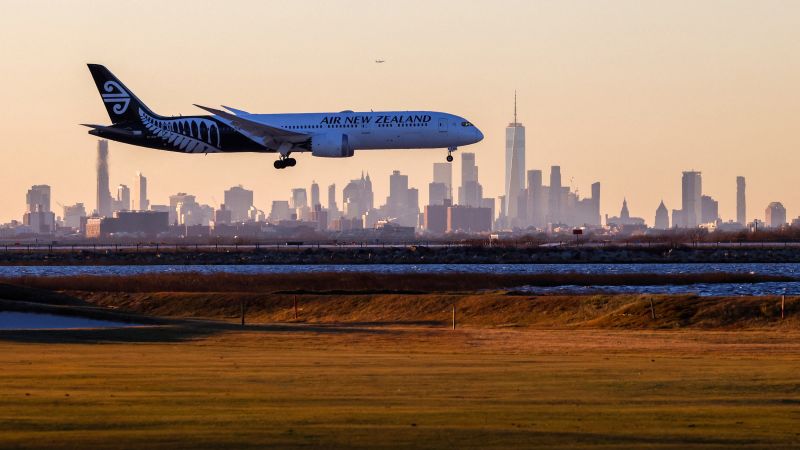London
CNN
—
Air New Zealand has ditched a key target to reduce its carbon emissions by 2030, citing delays in deliveries of new fuel-efficient aircraft and costly low-carbon jet fuels.
The airline said in a statement on Tuesday that it had been hamstrung in recent months by “the availability of new aircraft (and) the affordability and availability of alternative jet fuels.”
“It is possible the airline may need to retain its existing fleet for longer than planned due to global manufacturing and supply chain issues that could potentially slow the introduction of newer, more fuel-efficient aircraft into the fleet,” Greg Foran, the airline’s chief executive, said in the statement.
Air New Zealand is waiting for eight Boeing 787 Dreamliners and five Airbus A320neo and A3201neo planes, according to its website.
Boeing has faced a slew of safety and production problems in recent months, resulting in delayed deliveries of its jets to airlines. Airbus, too, last month blamed “persistent” issues in its supply chain for a cut to its number of planned deliveries this year.
Boeing did not immediately respond to a request for comment. An Airbus spokesperson told CNN that the company does not “disclose customer delivery schedules.”
Air New Zealand, which runs nearly 3,400 flights a week to 49 domestic and international destinations, set a target in 2022 to reduce its carbon emissions by 28.9% by the end of the decade when measured against 2019 levels.
Still, Air New Zealand’s decision to abandon its target is a warning shot for an industry trying to meet its climate goals through changes in aircraft design and the increased use of cleaner fuels, such as sustainable aviation fuel (SAF).
SAF has a lower carbon footprint than traditional jet fuel because it’s made from waste products, where the carbon has already been emitted; or from plants that absorb CO2 as they grow. But at the moment, there is far greater demand than supply of SAF.
That was much higher than the 5% reduction target in international aviation emissions by 2030 agreed by 193 countries at a United Nations-backed conference last November.
The aviation industry accounted for 2% of global energy-related carbon emissions in 2022, according to the International Energy Agency (IEA). However, that share could quickly increase if measures, such as transitioning to SAF, reducing flights and more efficient aircraft designs, are not adopted fast enough.
“Planned production capacity for sustainable aviation fuels will provide just a small fraction of jet fuel demand by 2027,” notes the IEA on its website.
In its statement, Air New Zealand said it was considering introducing “a new near-term” target that “could better reflect the challenges relating to aircraft and alternative jet fuel availability within the industry.” The airline’s ambition to achieve net zero by 2050 — meaning it would emit no more carbon into the atmosphere than it removes — remains unchanged, it added.
A New Zealand government discussion paper published in June showed that the country could miss its CO2 reduction target for 2035 because of a change in climate policies since its center-right government came into power last year, Reuters reported. New Zealand is one of several countries veering off track to hit targets in the 2030s.
Angela Dewan contributed reporting.









